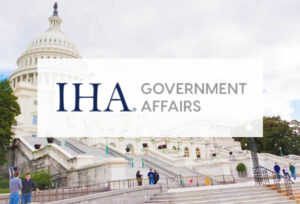In 1986, California voters approved Proposition 65 (the Safe Drinking Water and Toxic Exposure Act), a ballot initiative to address concerns about exposure to toxic chemicals. It requires California to publish a list of chemicals known to cause cancer or reproductive toxicity, and for businesses with 10 or more employees to provide warnings when they knowingly and intentionally…
CONTINUE READINGGovernment Affairs
Business Tax Breaks Scheduled to End
In 2017, the Republican-led Congress passed the Tax Cuts and Jobs Act (TCJA) using budget reconciliation to avoid a Senate filibuster and its 60-vote threshold. But the tradeoff for this process is that tax breaks benefiting IHA members and other businesses had to be temporary in order to meet budget reconciliation rules. The TCJA boosted the IRC Sec. 168(k) Bonus…
CONTINUE READINGTrade Issues Update
On June 2, Americans for Free Trade (AFT) sent a letter to the House Select Committee on the Chinese Communist Party (CCP) signed by IHA and 145 other organizations for the May 17 hearing Leveling the Playing Field: How to Counter the Chinese Communist Party’s Economic Aggression. Despite the enmity between Capitol Hill Republicans and Democrats, the Select Committee on the…
CONTINUE READINGControversial New Process for Regulations
On April 6, President Biden issued the Executive Order (EO) “Modernizing Regulatory Review” that will change the process by which federal agencies such as the U.S. Environmental Protection Agency and Departments of Transportation and Labor promulgate their regulations. The White House says these changes will improve the process, but administrative law experts believe the new…
CONTINUE READINGThe Limit, Save, Grow Act of 2023
On April 26, the U.S. House of Representatives passed the Limit, Save, Grow Act of 2023 (H.R. 2811) to suspend the federal government’s debt ceiling through either March 31, 2024, or a $1.5 trillion increase when the current $31.4 trillion ceiling runs out, whichever comes first. It’s not unusual for Congress to raise the debt ceiling so Treasury can continue to sell U.S. bonds…
CONTINUE READINGProposed PFAS Standards from the U.S. EPA
The U.S. Environmental Protection Agency (EPA) has taken steps to set maximum levels for certain polyfluoroalkyl and perfluoroalkyl substances (PFAS) in public drinking-water systems, and to designate certain PFAS as hazardous substances under the Comprehensive Environmental Response, Compensation and Liability Act or CERCLA (the Superfund law). PFAS are chemicals that have…
CONTINUE READINGIHA Submits Comments to USTR Tariff Review
As required by the Trade Act of 1974, the U.S. Trade Representative (USTR) must conduct a “necessity review” of the Section 301 tariffs on some $350 billion of products from China (Lists 1, 2, 3 and 4a) or the tariffs automatically sunset after four years. However, the Trade Act is somewhat vague on how a review should be done, giving USTR a fair amount of latitude in carrying…
CONTINUE READINGSignificant Trade and Shipping Regulatory Actions
The U.S. Trade Representative (USTR) is required by statute to conduct a “necessity review” of Section 301 tariffs, which in this case concern tariffs placed on some $300-$350 billion of products from China (Lists 1, 2, 3 and 4a). Former President Donald Trump started imposing the duties in 2018 under Sec. 301 of the Trade Act of 1974, which automatically expire after four…
CONTINUE READINGLabor Relations Regulatory Update
The Biden Administration’s regulatory agenda will face Republican scrutiny in the next Congress by way of oversight hearings and a stream of information requests to agency heads between hearings from committee chairs. Administration proposals concerning labor (employee) relations will be one of the more controversial areas based on Republican concerns that they will create more…
CONTINUE READING- « Previous Page
- 1
- 2
- 3
- 4
- 5
- 6
- …
- 8
- Next Page »



